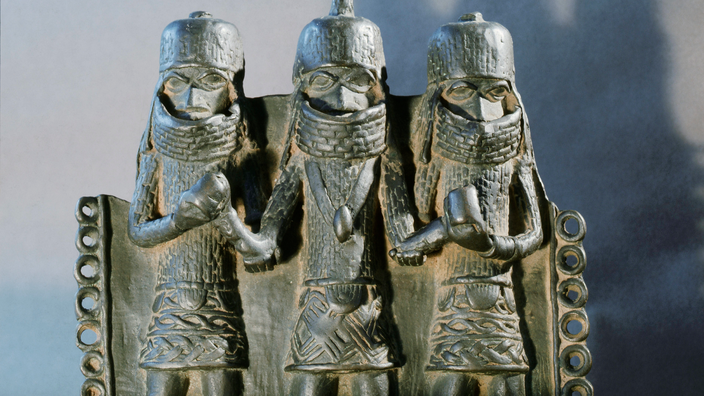The turnaround is unexpected.
The collection of Benin bronzes supposed to be on display in the brand new galleries of the Humboldt Forum in the heart of Berlin may finally be returned.
Andreas Görgen, responsible for cultural affairs at the German Ministry of Foreign Affairs, visited Nigeria last week to announce the start of a scientific and cultural collaboration around the future museum of African art to be created in Benin City, as well as to launch talks on the future of this set of 15th-18th century bronzes that adorned the royal palace of the former kingdom of Benin.
The return of this historical heritage, now dispersed in several European museums, has been demanded for years by the Nigerian authorities.
To read also: Stéphane Martin: "Africa cannot be deprived of the testimonies of its past"
Mentioned Monday by the director of the Humboldt Forum, Hartmut Dorgerloh, the decision of the restitution - partial or total - of the 440 bronzes of Benin preserved in Berlin could be taken "
in September
", according to the evolution of the discussions held with Nigeria.
If it is also necessary to count on the possible green light of the Foundation of the cultural heritage of Prussia, the German federal institution which manages the museums of Berlin, this dialogue seems to attest to an awareness of the shameful historical and colonial dimension of these objects.
“
As far as we know today, the Benin bronzes were largely acquired illegally
,” Hartmut Dorgerloh told the Artnet website, referring to the British punitive expedition of 1897 and the destructive plunder of Beninese heritage.
The consequences that these decisions will ultimately have on the planned presentation of Beninese bronzes at the Humboldt Forum are currently under discussion and will be decided in consultation with partners in Nigeria.
One thing is certain, the presentation of the collections addressed the question of this iniquitous past.
"
As Andreas Görgen's trip to Benin City attests, museum management is not going it alone.
The German delegate for Culture of the federal government, Monika Grütters, had confirmed at the beginning of the month that the question of the bronzes of Benin indeed polarized a large part of the criticisms against the criticized project of the Humboldt Forum.
“Virtually” inaugurated in December 2020 after seven years of work, the museum should welcome by the end of the year part of the collections - constituted during the colonial era - of the Museum of Asian Art and the Museum of Ethnology from Berlin.
In an interview granted on March 7 to the
Süddeutsche Zeitung
, Monika Grütters had suggested that there would "
certainly
" be restitutions, and that these could be more or less final, according to the turn that the discussions take.
On the Nigerian side, we are pleading for close collaboration with European museums, and for joint work rather than just one-off acts.
"
We believe that our collaboration should not be limited to the restitution of the works, but also to the understanding of the significance of these works in our history
", declared last week the governor of the Nigerian State of Edo, Godwin Obaseki.
It is becoming less and less likely that you will be able to show the bronzes without being ashamed of yourself.
Benedict Savoy
The transfer of the collections from the Museum of Ethnology in Berlin to the Humbolt Forum has aroused the indignation of part of German opinion for several months, as well as of specialists in colonial history.
In an interview published on Friday in the
Spiegel,
the historian at the Collège de France Bénédicte Savoy - who left the Humbolt Forum's advisory committee in 2017 - protested against the staging of these objects in new spaces: “
It is becoming less and less likely that you will be able to show the bronzes without being ashamed of yourself.
“If nothing has yet been established, the approach seems in any case to be going in the right direction, judges the German historian Jürgen Zimmerer.
"
This will fuel the global debate and put pressure on museums around the world,
" commented on Tuesday this specialist in colonial history and genocides, in an interview with Artnet.
Read also: Berlin revives its imperial palace, haunted by history
A movement to restore African heritage
This movement comes at a time rather favorable to the restitution of these colonial spoliations, with the launch, last autumn in Benin City, of the Emowaa construction site, the Edo museum for West African art ("
Edo Museum of West-African Art
”).
Like the Acropolis Museum in Athens opposite the Parthenon marbles, the Emowaa, whose architectural project was entrusted to David Adjaye, will reserve part of its galleries for thousands of bronzes from Benin, whose return has long been demanded.
More broadly, the colonial plundering of African heritage has been the subject of several major historical works in recent years.
In France, a report on the restitution of African cultural heritage, written by Bénédicte Savoy and historian Felwine Sarr, was submitted in 2018, following President Emmanuel Macron's trip to Ouagadoudou, in 2017, during which he declared that 'we could not "
accept that a large part of the cultural heritage of several African countries is in France
".
"
I want the conditions to be met for the temporary or final restitution of African heritage in Africa within five years
," Emmanuel Macron also wished on this occasion.
As a direct consequence of this presidential desire, the return of some twenty historical pieces to Senegal and Morocco was approved last fall by the Senate.
Read also: Benin demands from France the restitution of treasures of its heritage
The thousands of plaques and bronze statues from Benin scattered in European museums once adorned the columns and wooden furniture of the royal palace of Edo (now Benin City), sacked by the British in 1897. Sold to auctioned on their arrival in Europe, these objects form the heart of several major collections, in Vienna, Oxford, Berlin but above all in London, where the British Museum keeps more than 700 of these bronzes.
The objects preserved in Berlin form the second most important collection of bronzes in Benin, so their possible return puts pressure on the London institution, already targeted recently by new calls for the return of the Parthenon marbles.
Asked by the
Guardian
about the bronzes, the British Museum - which collaborates in the scientific program of Emowaa - once again highlighted its universal vocation, recalling that the violent context of the acquisition of objects is explained and put back into perspective. context through the mediation mechanisms of the museum.
An end of inadmissibility which was, until very recently, similar to that of the Museum of Ethnology in Berlin.








